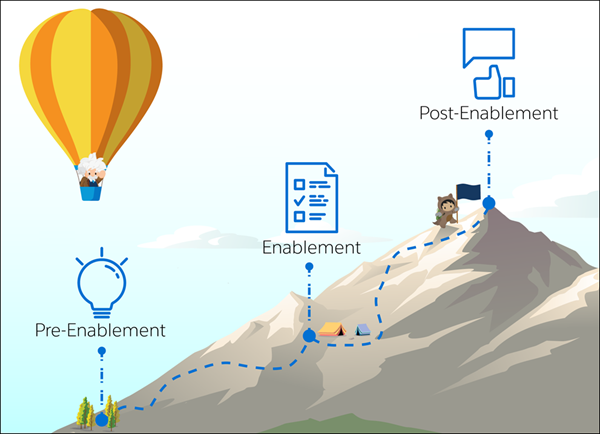Start with a Plan
Learning Objectives
- Group rollout tasks by rollout stage.
- Describe some of the challenges that sales reps and managers face.
Map Your Journey
Eleanor does her best thinking outside, so after her encounter with Ava, she leaves the office and goes for a walk. At first, the task of assigning 50 Sales Cloud Einstein licenses seems daunting, but after she breaks it down into smaller tasks, it doesn’t seem so hard. Eleanor reviews commonly recommended stages and tasks for Sales Cloud Einstein rollouts.

| Stage | Task | Details |
|---|---|---|
| Pre-enablement | Understand business challenges and priorities. | Here’s your chance to get the inside scoop on the real-life issues sales reps have. Talk with the leadership team and get their input about what’s most important. |
| Decide which Sales Cloud Einstein features to start with. | After you prioritize your business needs, it’s easy to figure out which features to start with. Don’t try to adopt all features at once, but do think about the future. | |
| Define goals and criteria for success. | Make sure everyone is aligned with what you want to get out of Sales Cloud Einstein and how you’ll know if you’re hitting the mark. | |
| Select an initial group of users. | Identify a small but varied group of users to test the features. They’ll help you iron out the wrinkles. | |
| Make sure the Salesforce org is ready for Einstein. | Data is key, so make sure yours is clean and plentiful. We have tools to evaluate your data readiness. | |
| Enablement | Turn on the features. | There are a few things you need to do in Setup, but we guide you along the way. |
| Test in a sandbox. | Know what you’re getting into. A sandbox is great for testing how Sales Cloud Einstein features work with your existing architecture, workflows, and Lightning components. | |
| Start communicating with and training your users. | Tell your users what you want them to get out of Sales Cloud Einstein, and then show them how to do it. | |
| Assign users to Sales Cloud Einstein. | After the features are set up and your team is ready, you can open the door to Einstein. | |
| Post-enablement | Get feedback from users. | Give users ways to share their feedback, thoughts, and questions. Try Chatter groups, check-in meetings, surveys, you name it. Just get them talking (or typing). |
| Expand your deployment. | Learn from small user groups, then make necessary adjustments, and assign more licenses. You might also be ready to start using more Sales Cloud Einstein features. |
Identify Your Team’s Challenges
Eleanor quickly learns about specific Sales Cloud Einstein features, but she doesn’t know how the features lead to success at Honeydew. Her first step is to set up a meeting with Honeydew’s Lead Sales Operations Manager, Sayuni Patel, to find out more about how the sales teams work and what their most pressing challenges are.
Sayuni was part of the executive team that purchased Sales Cloud Einstein. During the research part of the process, she talked to the sales teams and uncovered their biggest challenges. She knows the marketing pitch about Sales Cloud Einstein making the sales process smarter at every step, but she doesn’t know how Sales Cloud Einstein can solve Honeydew’s specific problems. So she’s thrilled when Eleanor reaches out to talk about the rollout plan.

Over a long lunch, Sayuni tells Eleanor all about the sales organization and its challenges. She describes the variety of experience levels—some reps are fresh out of college, some have years of experience, and others fall somewhere in between. Not everyone struggles with the same things. Challenges also vary by sales role. Inside sales reps spend their days at their desks nurturing leads. They have different needs than the field sales reps, who work to close deals and grow business. Sales managers focus on coaching reps and maintaining customer relationships.
After an insightful discussion, Eleanor leaves lunch with a full belly and a solid understanding of how Sales Cloud Einstein can help improve sales at Honeydew. She heads back to her office and jots down a summary of Honeydew’s challenges. How many of these challenges do you have at your company?
| Challenge | Description | SalesCloud Einstein Feature |
|---|---|---|
| Not enough time to pursue all leads | Time is limited. So it’s key that reps spend their valuable time on the leads that are most likely to convert. |
Einstein Lead Scoring
When reps use scores to prioritize their list of leads, they can focus on the ones that have the highest chance of conversion. |
| Too many details get lost in email | When email is the primary tool of communication, it’s easy to miss the finer points. Plus, having too many leads results in too many follow-up actions. It’s hard to keep track of what’s most important. If reps wait too long, they can miss a chance to convert. |
Einstein Email Insights
Actionable intelligence in reps’ inboxes helps identify which customers need attention. Salesforce Inbox A suite of productivity tools helps reps focus on what needs attention. For example, Email Tracking helps reps focus on engaged prospects. Insert Availability makes scheduling meetings a breeze. |
| Can’t keep up with data entry | Keeping the sales team productive is hard when records get out of date. |
Einstein Automated Contacts
Contact records are automatically added to Salesforce, so reps spend less time on data entry. Einstein Activity Capture Having email and event data automatically logged on Salesforce records increases reps’ productivity and visibility into potential customers. |
| Challenge | Description | Sales Cloud Einstein Feature |
|---|---|---|
| Can’t strategize selling time | It’s hard to know how to spend limited selling time, and easy to lose deals by spending too much time on the wrong opportunities. |
Einstein Opportunity Scoring
Reps prioritize deals based on scores that indicate how likely an opportunity is to close. For example, a rep can prioritize high-scoring opportunities that are in early stages. |
| Difficult to identify at-risk opportunities | Reps who determine how likely a deal is to close by looking at opportunity stage can be wrong about a deal. For example, a late-stage opportunity can actually have a low chance of closing, but the rep’s assumptions about the stage led them to ignore the at-risk deal. |
Einstein Opportunity Scoring
Because scores are based on real data, reps get an accurate understanding of their opportunities. Reps see the factors that contribute to the score, which helps them take appropriate action. |
| Challenge | Description | Sales Cloud Einstein Feature |
|---|---|---|
| Difficult to identify business risk and know when to coach sales reps on how to address risk | Managers supervise multiple reps who own multiple opportunities. How do managers know which reps need help on which opportunities? |
Einstein Opportunity Scoring
When coaching reps, managers focus on opportunities with low scores. Managers also flag low-scoring opportunities to identify business risks early. |
| Can’t build accurate sales forecasts | When managers don’t understand the health of their leads and opportunities, it’s hard to work toward realistic goals. Today, managers build forecasts based on guesses and sales reps’ predictions. |
Einstein Lead Scoring and Opportunity Scoring
Managers understand the health of their leads and opportunities better, and can share relevant information with others. Einstein Forecasting Einstein forecasts are based on AI that analyzes past sales data, explores how records change over time, and tracks new changes. This data analysis is the basis for accurate and objective forecasts. |
| Unclear whether team can make their quota. | Managers rely on reps to provide individual forecasts, which can be biased. It’s hard to evaluate the accuracy of forecasts. |
Einstein Forecasting
When managers have a better understanding of the team’s performance, they can coach their reps more effectively. Sales Analytics App Managers analyze sales data, look at opportunity whitespace, review pipeline status, and evaluate team and rep performance better than they did without sales analytics. |